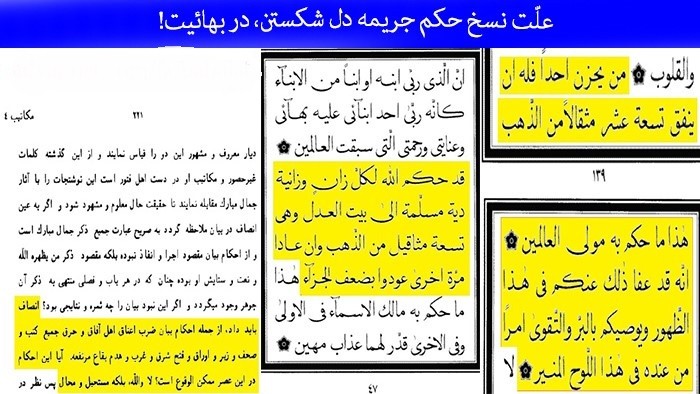آنچه در ادامه می خوانید
The abolition of Ali Muhammad’s commandment by Baha
the forged prophet of Baha’ism has announced the abolition of one of Bab‘s commandments (concerning the punishment of 19 methqal of gold for making people angry).
“قد منعتم فی الکتاب من الجدال و النزاع و الضرب و امثالها عمّا تحزن به الافئده و القلوب من یحزن احداً فله ان ینفق تسعه عشر مثقالاً من الذهب هذا ما حکم به مولی العالمین”
“You were prevented conflicting, fighting and beating and the like. You were prevented making others upset. If you do, you must pay 19 methqal of gold. This is what was ordered by the guardian of the worlds[1].”

He continued and announced the abolition of Babism leader’s commandment and wrote:
“انه قد عفا ذلک فی هذا الظهور و یوصیکم بالبر و التقوی امراً من عنده فی هذا اللوح المیز”
“Surely, you have been forgiven in the emergence (Baha’ism) and I recommend you to goodness and piety. A commandment from him in the bright tablet.[2]“
Criticism:
- This commandment isn’t practical and is used for propaganda because sadness is a conscience issue and there isn’t any criterion for distinguishing it.
- In other places, Ali Muhammad Shirazi has ordered for all of his opponents to be killed:
“Gutting heads, burning all books and destroying all high tombs are of the commandments of the book Bayan[3]…”
How is it possible for Ali Muhammad Bab who has been the forerunner of three domestic wars in Iran to appoint such heavy punishment for making a person upset?!
- Ali Muhammad Bab who has ordered for his Iranian opponents to be dismissed from Azerbaijan, Khorasan, Mazandaran, Fars and Iraq[4] hasn’t thought that he must pay several tons of gold for making the Iranian upset?!!!
[۱] Hussein Ali Nouri, the Aqdas, the electronic copy, p. 139, paragraph 148.
[۲] Ibid, p. 140, paragraph 148.
[۳] Abbas Effendi, excerpts from Makatib, Germany: The national assembly of publishing the faith works, 2000 A.D., Vol. 4, p. 221.
[۴] Refer to Ali Muhammad Shirazi, the Persian Bayan, p. 193; the best story, the interpretation of Yousof chapter, chapters 96-102, Abdul Hamid Ishraq Khawari, the treasury of limitations and commandments, p. 273; Asadullah Mazandarani, Zohorul Hagh, Vol. 3, p. 255 and…






